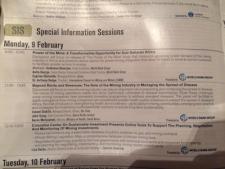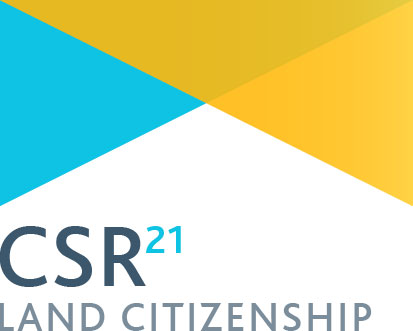
Indaba Day 1, Pt 2 of 3: Mines & diseases
The Role of the Mining Industry in Managing the Spread of Disease
The second of the world bank sessions today was a lively discussion, with industry representatives not afraid to draw lines under government expectations that they take over what they argued is the role of the state, and Ministers equally prepared to keep pushing. The panel consisted of Ismael Diakité, Rio Tinto’s Managing Director in Guinea; the fiery Aaron Motsoaledi, South African Minister of Health; John Sisay, CEO of Sierra Rutile Limited; Sam Russ, Liberia’s Deputy Minister of Mines, Land and Energy; and Godfrey Oliphant, South African Deputy Minister of Mineral Resources.
The tone here was a little more sober than earlier, with the opening statement rom the Chair that while the mining sector has the potential to be an engine for development, “It's potential: not even close to guaranteed." The context is equally sobering: Africa has what was euphemistically described as a “dynamic health sector,” with HIV, malaria, TB and recently ebola pushing health systems hard, and mining specific issues including TB, silicosis, HIV, health and safety and even unique cancers developing around the mining industry. While there are obvious starting points for the discussion—healthy workers and communities are good for the bottom line—“we’re not,” the Chair concluded, “anywhere close to where we need to be.”
Government perspective
Min. Motsoaledi emphasised TB, pointing out the odd paradox that TB doesn't evoke the passionate response in trade unions that mine accidents do, though it kills many more people: citing the last year of available statistics for SA, he said that while accidents in mines caused 167 fatalities, there were 1,143 TB deaths; but the response was to the accidents. What’s required, he said, apart from the obvious info campaigns, is a common SADEC database on TB (as workers are migratory); a common treatment protocol; and a shared understanding of referral patterns. The mines, he argued, hold great responsibility for responding to this, as am nay of these diseases are worsened or even caused by the industry. Minister Elephant added that SA is working on finding new ways to integrate mines into health, and cited a recent tripartite conference of mines, government & trades unions, all of whom agreed on the need for effective partnerships. He highlighted what he decreased as SA’s “strong policy and regulatory regime,” and pointed out how the country “works hard to raise awareness and ensure compliance.”
Liberian Deputy Minister Russ agreed that mines have critical role in complementing health systems, especially in remote areas, but was more emollient in his approach, stressing that Liberian policy has been to avoid placing any explicit obligation on mines to this effect.
Mines push back
While the Rio Tinto representative was keen to emphasise how his company "we puts CSR in first place” withe the aim to “engage with communities and build long term partnerships with govt,” John Sisay of Sierra Rutile made the forceful case that “private companies are not a primary responsible agent for health care. Sierra Rutile’s first priority in this regard, he said, is its workers; then its immediate local communities. “To suggest companies she assume responsibility for health,” he said, “you must discuss the proper use of the taxes those companies pay." Which is a pretty powerful point but not one that was really picked up. Rutile also pointed out how smaller companies were effectively forced to respond - with only one or two sites they’re so vulnerable that they have to, while multinationals in similar situations can pick and choose their operations.
A risky future
Once again, discussion was lively - look back over our Twitter feed for Monday Feb 9th for a blow-by-blow - with Min. Motsoaledi particularly punchy. While talk ranged back and forth over a range of health threats and possible responses and models for private/public partnership, general consensus was that ebola has been a timely warning. With the coming tripartite threat of climate change, habitat encroachment with population growth and the accompanying risk posed by emerging pathogens, and the post-antibiotic era, the need is for stronger health systems. “And until African Ministers get treated on the continent instead Europe or the east,” said Motsoaledi, “until they are treated on the continent and they die on the continent, we won't have strong systems." Applause from the audience for that one.
Substance
We couldn’t help feeling, though, that this session was shorter on substance than the earlier one. While there was much encouraging talk about the need for partnerships and action and progress, there enough much by way of solid ideas how. They were touched upon, of course, but detail was lacking.
The moderator’s summary was of an “honest, passionate and specific conversation in which the word ‘partnership’ was mentioned 95 times.” Specific suggestions for how that might come about included data & protocol sharing; but while there seems to be, on the basis of this discussion at least, a movement towards an actionable blueprint for actually doing something, the challenge is to build the right kinds of partnership with specific actions so that this debate isn’t here in another 100 years. Health, he concluded, offers a chance to make a big difference. It’s exciting.
An elephant (not) in the room?
There were a couple of points we’d have loved to have heard made, and we submitted a couple of linked questions ourselves, but sadly they didn’t survive the time cutoff. Mines can’t be expected to be experts on health systems, we pointed out, so what are governments doing to provide guidance to mines wishing to support community health? And in countries where—for example—the ebola response has been largely the work of NGOs, who provides strategic oversight to integrate all activity, including that of mines, at national level?
ENDS
Photo taken at 2015 Investing in African Mining Indaba, 9-12 February in Cape Town, South Africa.





